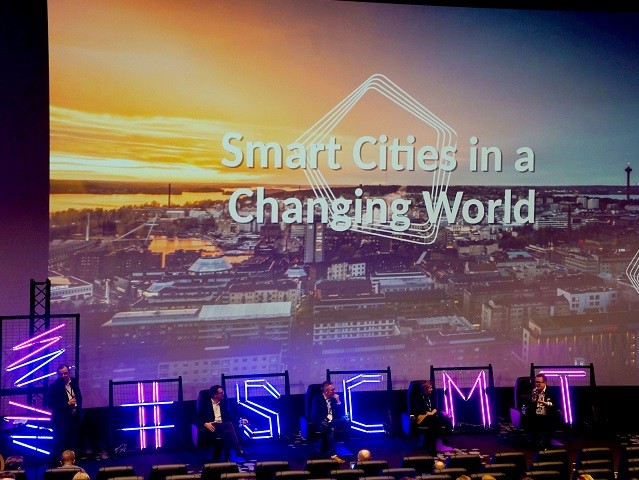Facing a Brave New World with Carbon Neutrality
January 28, 2020, Tampere - STARDUST in partnership with its Lighthouse city of Tampere, Energy Wise Cities and Puurakentaminen kasvuun Pirkanmaalla, organised the session on “Carbon Neutral Building & Energy” at the Mindtrek Conference organised during this year’s Tampere Smart City Week. In this session, STARDUST’s Finnish partners, Enermix Oy and Aurinkotekno Oy, also presented their key results on smart district heating, and introduction of net zero energy buildings in Tampere. One key issue in Finland is its unregulated heating market facing increasing competition. Having been an industrial haven in Finland, STARDUST’s Lighthouse city of Tampere is finding ways to disrupt the market by introducing unconventional energy efficient solutions. Janne Heinonen from Enermix Oy recounted the initial results of their demand-response in district heating while Jukka Mäkelä from Aurinkotekno presented images of Tampere’s district Ilokkaanpuisto where they are building Net Zero Energy Buildings and an off-site renewable energy production site to sustain future residents’ needs. The session saw the participation of many other high-level speakers. As Finland plans on becoming carbon neutral by 2035, speakers explored what remains to be of hindsight for cities around the globe when meeting an ambitious carbon neutrality goal - the need to re-assess the way we create our homes and buildings and consume energy. Carbon neutrality as defined by Matti Kuittinen from the Finnish Ministry of Environment is having a balance between carbon emissions and (carbon) sinks. At a national level, this seems like a grandiose plan yet Holger Wallbaum from the Chalmers University pointed out that these can take place starting with our cities. “Urbanisation is one of the main drivers for electricity increase. We as consumers use digital devices in our upcoming or to-date smarter homes, and this is one of the major drivers for electricity consumption.” In spite of our (smart) cities’ efforts on reducing greenhouse gas emissions and taking climate action, Holger Wallbaum warned us that our current policies remain insufficient for us to meet the Paris Agreement goals. Our future will therefore go downhill from here as we continue to do the way things are. Carbon neutrality starts with buildings On one hand, we have found a way to provide cleaner energy into our homes and buildings using renewable resources, yet Holger reminded us to look at another standpoint: the way our homes are built. Embodied carbon, as defined by Holger, is the energy used to produce our building and construction materials today. The World Green Building Council released a report which demands the construction sector to meet embodied carbon reduction goals by 2030 and by 2050. With the rising popularity of the circular economy and the bioeconomy in Europe, architects grabbed the opportunity to re-design cities’ living spaces in another light. Ulla Hahn from FutureBuilt recounted tales of introducing sustainable architecture in Oslo (Norway) through visions and through fair competition, innovation and reduced carbon footprint initiatives. On the other hand, Markku Karjalainen from Tampere University, presented Finland’s long-standing history behind wooden-based buildings, and its latest innovations which may out beat other conventional construction materials such as cement. While these radical ideas may reverse the tide and meet the carbon neutrality objective in Finland, Matti Kuittinen stressed the importance of taking actions that are more decisive and rejecting the norm. In short, we need to change the overall mentality of the construction sector. For one, Tytti Bruce-Hyrkäs from Bionova Oy presented her company’s case study. They built a tool that provides a carbon footprint estimation for construction investments in Turku, Helsinki and Tampere. Read the full article on: http://stardustproject.eu/news/facing-a-brave-new-world-with-carbon-neutrality/
Keywords
energy consumption, carbon neutrality, clean energy, sustainable architecture, renewable energy, cultural shock, progressive economic mind sets



